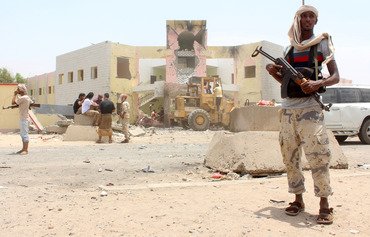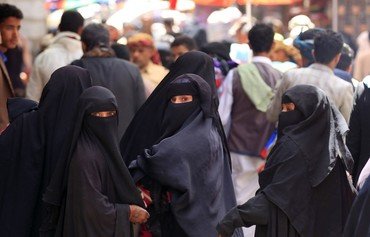Yemeni officials and human rights activists have renewed their appeal for a peaceful solution to the war, saying governance is suffering and poverty and corruption are flourishing as the warring sides focus on fighting each other.
They expressed their hope that all parties to the conflict will engage with a new plan to re-launch negotiations to end the war which the UN's new special envoy to Yemen, Martin Griffiths, has promised to present by mid-June.
As the war enters its fourth year, there have been an increasing number of reported instances of violations and corruption.
Earlier this month, for example, Human Rights Watch issued a report saying government employees had "tortured, raped and executed" migrants and asylum seekers at the Buraika detention centre in Aden.
Migrants held at the facility -- in use since early 2017 -- were denied refugee protection and often deported en masse into rough seas, according to HRW.
Interior Minister Ahmed al-Misri ordered the "immediate arrest" of Col. Khalid al-Alwani, the centre's commander, and began transferring detainees to another facility.
Al-Alwani is currently under investigation "over human rights violations and cases of rape against African migrants", the ministry said in a statement.
Al-Alwani was suspended from his role overseeing the Buraika detention centre in mid-March, but continued to serve as a police chief for Aden's Mualla district.
The ministry said it will carry out a full investigation and take legal action against those found guilty of abuses, "regardless of whether they are members of the ministry".
Peace talks must resume
Preventing violations and alleviating the overall state of misery in Yemen will only be possible if "all parties make concessions and meet the demands for peace", said Abdullah al-Manakhi, adviser to the General Investment Authority.
"The suffering that Yemenis have endured for three years is unbearable," he told Al-Mashareq, noting that a return to negotiations is the only viable option.
Reports of violations and misconduct at the detention centre come as 22 million Yemenis are in need of assistance, he said, noting that the suspension of government salaries has driven many Yemenis into poverty.
The situation impels politicians to do something about it, he said, and makes it imperative for them to respond to the efforts of the UN's new special envoy to Yemen, who took office in mid-February, "and engage in serious peace talks".
"Human rights violations are the result of the cumulative effects of the war, which has gone on too long," said Tareq al-Zuraiqi, secretary-general of the Humanitarian Organisation for Peace, Relief and Development.
The warring parties must "work towards peace and dialogue, and towards putting the interest of the Yemeni people and their freedom, security and sovereignty over their land above all considerations", he told Al-Mashareq.
Absence of state authority
Al-Zuraiqi said the human rights violations taking place in Yemen include the targeting, besieging and starving of civilians and the destruction of infrastructure, in violation of all norms and laws.
The war has ravaged the country, which is suffering acutely from an absence of state authority, law and accountability, said Khaled al-Faqih, programme director at the Ibb local radio station.
"In the absence of the government’s role, civil society organisations have an important role to play in working in earnest to help the powerless citizens who pay the tax of war on a daily basis," he told Al-Mashareq.
Al-Faqih appealed to all parties to the conflict to seek a peaceful solution.
"We are weary and tired of war, destruction and bloodshed," he said. "It is time for us to seek peace, return to dialogue and co-exist as loving brothers and partners in building and development."

![Displaced Yemenis sit inside a tent at a makeshift camp in the Haradh area, in the northern Abys district of Yemen's Hajjah province, on April 16th. [Essa Ahmed/AFP]](/cnmi_am/images/2018/05/02/12419-Yemen-Hajjah-children-600_384.jpg)






The war has killed us; it has destroyed our future and ruined the people. Only the unjust and sinners benefit from this. Until when? Time is against us. There is no business or education.
Reply1 Comment(s)